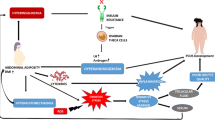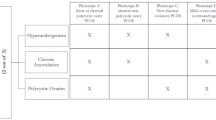Abstract
Background
The associations between TNF-α and Interleukin gene polymorphisms and polycystic ovary syndrome (PCOS) risk have been studied in numerous epidemiological studies, but the results remain controversial. To investigate whether these polymorphisms facilitate susceptibility to PCOS, we conducted a comprehensive systematic review and meta-analysis.
Methods
PubMed, Embase, Web of Science, Medline, CNKI, and Google Scholar were searched to obtain the genetic association studies according to the Preferred Reporting Items for Systematic Reviews and Meta-Analyses (PRISMA) guidelines. Odds ratios (OR) with corresponding 95 % confidence intervals (CI) were used to assess the strengths of the associations. Funnel plots and Egger’s tests were performed to test for possible publication bias. All statistical analyses were performed using Review Manager 5.2 and STATA11.0.
Results
Eighteen articles were included in the final meta-analysis. The studies involved the following polymorphisms: TNF-α -308G > A, TNF-α -805C > T, TNF-α -1031 T > C, IL-1A -889C > T, IL-1B -511C > T, IL-1B +3953 T > C, IL-6 -174G > C, IL-10 -819C > T, IL-10 -1082A > G, IL-18 -607C > A, and IL-18 -137G > C. Our results show a significant association between PCOS risk and the TNF-α -1031 T > C polymorphism (For TC + CC vs. TT: OR = 2.09, 95 % CI = 1.58–2.76, p < 0.0001. For C allele vs. T allele: OR = 1.67, 95 % CI = 1.33–2.09, p < 0.0001) and between PCOS risk and the IL-6 -174G > C polymorphism (For CC + GC vs. GG: OR = 0.49, 95 % CI = 0.25–0.95, p = 0.03. For CC vs. GG: OR = 0.48, 95 % CI = 0.28–0.80, p = 0.005. For C vs. G: OR = 0.60, 95 % CI = 0.42–0.87, p = 0.007). No associations were found with the other genetic models.
Conclusion
The results of the meta-analysis suggest positive associations between the TNF-α -1031 T > C and IL-6 -174G > C polymorphisms and the risk of PCOS. No associations are found between PCOS risk and the TNF-α -308G > A, TNF-α -805C > T, IL-1A -889C > T, IL-1B -511C > T, IL-1B +3953C > T, IL-10 -819C > T, IL-10 -1082 A > G, IL-18 -607C > A, and IL-18 -137G > C polymorphisms. However, due to the heterogeneity and low quality of the studies related to PCOS polymorphisms in the meta-analysis, the results should be interpreted with caution. Future multi-ethnicity studies of homogeneous populations of PCOS patients with larger sample sizes and well-matched controls are needed.




Similar content being viewed by others
References
Goodarzi MO, Dumesic DA, Chazenbalk G, Azziz R. Polycystic ovary syndrome: etiology, pathogenesis and diagnosis. Nat Rev Endocrinol. 2011;7(4):219–31. doi:10.1038/nrendo.2010.217.
Brassard M, AinMelk Y, Baillargeon JP. Basic infertility including polycystic ovary syndrome. Med Clin N Am. 2008;92(5):1163–92. doi:10.1016/j.mcna.2008.04.008.
Mani H, Levy MJ, Davies MJ, Morris DH, Gray LJ, Bankart J, et al. Diabetes and cardiovascular events in women with polycystic ovary syndrome: a 20-year retrospective cohort study. Clin Endocrinol (Oxf). 2013;78(6):926–34. doi:10.1111/cen.12068.
Dokras A. Cardiovascular disease risk factors in polycystic ovary syndrome. Semin Reprod Med. 2008;26(1):39–44. doi:10.1055/s-2007-992923.
Ojeda-Ojeda M, Murri M, Insenser M, Escobar-Morreale HF. Mediators of low-grade chronic inflammation in polycystic ovary syndrome (PCOS). Curr Pharm Des. 2013;19(32):5775–91.
Stang A. Critical evaluation of the Newcastle-Ottawa scale for the assessment of the quality of nonrandomized studies in meta-analyses. Eur J Epidemiol. 2010;25(9):603–5. doi:10.1007/s10654-010-9491-z.
Tumu VR, Govatati S, Guruvaiah P, Deenadayal M, Shivaji S, Bhanoori M. An interleukin-6 gene promoter polymorphism is associated with polycystic ovary syndrome in South Indian women. J Assist Reprod Genet. 2013;30(12):1541–6. doi:10.1007/s10815-013-0111-1.
Xia YH, Yao L, Zhang ZX. Correlation between IL-1beta, IL-1Ra gene polymorphism and occurrence of polycystic ovary syndrome infertility. Asian Pac J Trop Med. 2013;6(3):232–6. doi:10.1016/S1995-7645(13)60030-9.
Kosova G, Urbanek M. Genetics of the polycystic ovary syndrome. Mol Cell Endocrinol. 2013;373(1–2):29–38. doi:10.1016/j.mce.2012.10.009.
Deligeoroglou E, Vrachnis N, Athanasopoulos N, Iliodromiti Z, Sifakis S, Iliodromiti S, et al. Mediators of chronic inflammation in polycystic ovarian syndrome. Gynecol Endocrinol. 2012;28(12):974–8. doi:10.3109/09513590.2012.683082.
Yang Y, Qiao J, Li MZ. Correlation between interleukin-1 and the obesity of polycystic ovary syndrome. Zhonghua Fu Chan Ke Za Zhi. 2012;47(1):9–13.
Kim JW, Lee MH, Park JE, Yoon TK, Lee WS, Shim SH. Association of IL-18 genotype with impaired glucose regulation in Korean women with polycystic ovary syndrome. Eur J Obstet Gynecol Reprod Biol. 2012;161(1):51–5. doi:10.1016/j.ejogrb.2011.12.008.
Kawamura S, Maesawa C, Nakamura K, Nakayama K, Morita M, Hiruma Y, et al. Predisposition for borderline personality disorder with comorbid major depression is associated with that for polycystic ovary syndrome in female Japanese population. Neuropsychiatr Dis Treat. 2011;7:655–62. doi:10.2147/NDT.S25504.
Lin YS, Tsai SJ, Lin MW, Yang CT, Huang MF, Wu MH. Interleukin-6 as an early chronic inflammatory marker in polycystic ovary syndrome with insulin receptor substrate-2 polymorphism. Am J Reprod Immunol. 2011;66(6):527–33. doi:10.1111/j.1600-0897.2011.01059.x.
Yang Y, Qiao J, Li MZ. Association of polymorphisms of interleukin-18 gene promoter region with polycystic ovary syndrome in chinese population. Reprod Biol Endocrinol. 2010;8:125. doi:10.1186/1477-7827-8-125.
Mu Y, Liu J, Wang B, Wen Q, Wang J, Yan J, et al. Interleukin 1 beta (IL-1beta) promoter C [−511] T polymorphism but not C [+3953] T polymorphism is associated with polycystic ovary syndrome. Endocrine. 2010;37(1):71–5. doi:10.1007/s12020-009-9268-x.
Vural P, Degirmencioglu S, Saral NY, Akgul C. Tumor necrosis factor alpha (−308), interleukin-6 (−174) and interleukin-10 (−1082) gene polymorphisms in polycystic ovary syndrome. Eur J Obstet Gynecol Reprod Biol. 2010;150(1):61–5. doi:10.1016/j.ejogrb.2010.02.010.
Yang Y, Qiao J, Tang RX, Li MZ. Genotype and haplotype determination of interleukin (IL) 1 beta (g. -511C > T and g. +3954C > T) and IL-1RN in polycystic ovary syndrome. Fertil Steril. 2010;94(1):384–6. doi:10.1016/j.fertnstert.2009.09.042.
Erdogan M, Karadeniz M, Berdeli A, Tamsel S, Yilmaz C. The relationship of the interleukin-6–174 G > C gene polymorphism with cardiovascular risk factors in Turkish polycystic ovary syndrome patients. Int J Immunogenet. 2009;36(5):283–8. doi:10.1111/j.1744-313X.2009.00867.x.
Wang B, Zhou S, Wang J, Liu J, Ni F, Liu C, et al. Lack of association between interleukin-1a gene (IL-1a) C (−889) T variant and polycystic ovary syndrome in Chinese women. Endocrine. 2009;35(2):198–203. doi:10.1007/s12020-009-9152-8.
Erdogan M, Karadeniz M, Berdeli A, Alper G, Caglayan O, Yilmaz C. The relationship of the interleukin-6–174 G > C gene polymorphism with oxidative stress markers in Turkish polycystic ovary syndrome patients. J Endocrinol Investig. 2008;31(7):624–9.
Karadeniz M, Erdogan M, Zengi A, Tamsel S, Berdeli A, Saygili F, et al. Polymorphism of the interleukin-10 gene in polycystic ovary syndrome. Int J Immunogenet. 2008;35(2):119–23. doi:10.1111/j.1744-313X.2007.00746.x.
Kolbus A, Walch K, Szabo L, Huber JC, Nagele F, Unfried G. A polymorphism of the interleukin 1 receptor antagonist is not associated with polycystic ovary syndrome in Caucasian women. Fertil Steril. 2006;85(2):523–5. doi:10.1016/j.fertnstert.2005.07.1317.
Mohlig M, Spranger J, Osterhoff M, Ristow M, Pfeiffer AF, Schill T, et al. The polycystic ovary syndrome per se is not associated with increased chronic inflammation. Eur J Endocrinol. 2004;150(4):525–32.
Kolbus A, Walch K, Nagele F, Wenzl R, Unfried G, Huber JC. Interleukin-1 alpha but not interleukin-1 beta gene polymorphism is associated with polycystic ovary syndrome. J Reprod Immunol. 2007;73(2):188–93. doi:10.1016/j.jri.2006.08.002.
Walch K, Grimm C, Zeillinger R, Huber JC, Nagele F, Hefler LA. A common interleukin-6 gene promoter polymorphism influences the clinical characteristics of women with polycystic ovary syndrome. Fertil Steril. 2004;81(6):1638–41. doi:10.1016/j.fertnstert.2004.01.021.
Deepika ML, Reddy KR, Yashwanth A, Rani VU, Latha KP, Jahan P. TNF-alpha haplotype association with polycystic ovary syndrome - a South Indian study. J Assist Reprod Genet. 2013;30(11):1493–503. doi:10.1007/s10815-013-0080-4.
Yun JH, Choi JW, Lee KJ, Shin JS, Baek KH. The promoter −1031(T/C) polymorphism in tumor necrosis factor-alpha associated with polycystic ovary syndrome. Reprod Biol Endocrinol. 2011;9:131. doi:10.1186/1477-7827-9-131.
Korhonen S, Romppanen EL, Hiltunen M, Mannermaa A, Punnonen K, Hippelainen M, et al. Lack of association between C-850 T polymorphism of the gene encoding tumor necrosis factor-alpha and polycystic ovary syndrome. Gynecol Endocrinol. 2002;16(4):271–4.
Peral B, San Millan JL, Castello R, Moghetti P, Escobar-Morreale HF. Comment: the methionine 196 arginine polymorphism in exon 6 of the TNF receptor 2 gene (TNFRSF1B) is associated with the polycystic ovary syndrome and hyperandrogenism. J Clin Endocrinol Metab. 2002;87(8):3977–83. doi:10.1210/jcem.87.8.8715.
Mao W, Yu L, Chen Y. Study on the relationship between a polymorphism of tumor necrosis factor-alpha gene and the pathogenesis of polycystic ovary syndrome. Zhonghua Fu Chan Ke Za Zhi. 2000;35(9):536–9.
Milner CR, Craig JE, Hussey ND, Norman RJ. No association between the −308 polymorphism in the tumour necrosis factor alpha (TNFalpha) promoter region and polycystic ovaries. Mol Hum Reprod. 1999;5(1):5–9.
Xu X, Du C, Zheng Q, Peng L, Sun Y. Effect of metformin on serum interleukin-6 levels in polycystic ovary syndrome: a systematic review. BMC Womens Health. 2014;14:93. doi:10.1186/1472-6874-14-93.
Dai L, Liu D, Guo H, Wang Y, Bai Y. Association between polymorphism in the promoter region of Interleukin 6 (−174 G/C) and risk of Alzheimer’s disease: a meta-analysis. J Neurol. 2012;259(3):414–9. doi:10.1007/s00415-011-6164-0.
Acknowledgments
No funding was provided for the analysis.
Conflict of interest
None Declared.
Author information
Authors and Affiliations
Corresponding author
Additional information
Capsule The twelve SNPs for TNF-α and Interleukin genes: TNF-α -1031T > C and IL-6 -174G > C are associated with PCOS risk, and no associations are found in TNF-α -308G > A, TNF-α -805C > T, IL-1A -889C > T, IL-1B -511C > T, IL-1B +3953C > T, IL-10 -819C > T, IL-10 -1082 A > G, IL-18 -607C > A, and IL-18 -137G > C polymorphisms.
Electronic supplementary material
Below is the link to the electronic supplementary material.
ESM 1
(DOC 71 kb)
Rights and permissions
About this article
Cite this article
Wu, H., Yu, K. & Yang, Z. Associations between TNF-α and interleukin gene polymorphisms with polycystic ovary syndrome risk: a systematic review and meta-analysis. J Assist Reprod Genet 32, 625–634 (2015). https://doi.org/10.1007/s10815-015-0449-7
Received:
Accepted:
Published:
Issue Date:
DOI: https://doi.org/10.1007/s10815-015-0449-7




